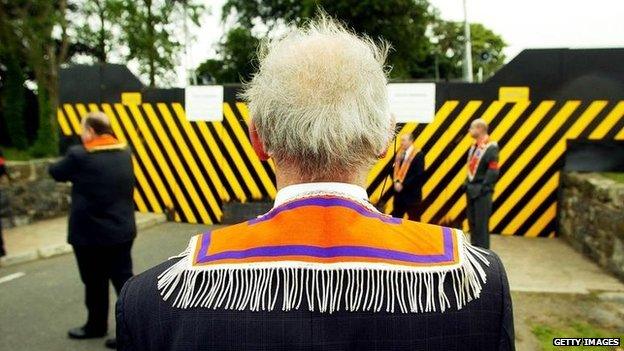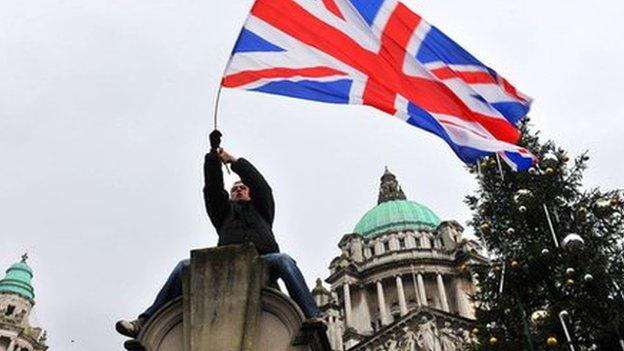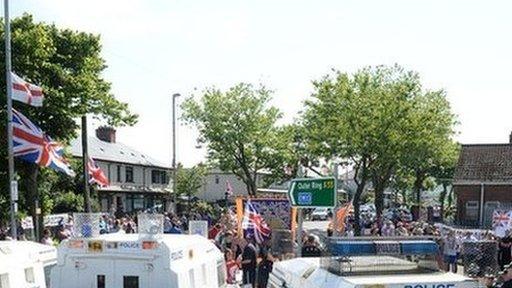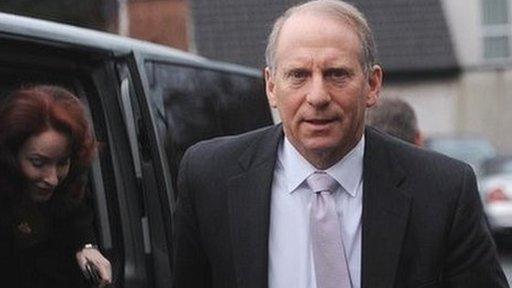Peter Robinson: Parades Commission ruling is threat to institutions
- Published
Jonathan Bell said that any response to the determination "should be peaceful and lawful"
Northern Ireland First Minister Peter Robinson has said the Stormont institutions have been put under threat by a ruling on an Orange Order parade.
Earlier, unionist parties walked out of talks about contentious issues in Northern Ireland, in protest at the Parades Commission determination.
The talks on parades, flags and the past were being held at Stormont.
The commission barred a 12 July Orange Order parade from returning along part of the Crumlin Road in north Belfast.
The Parades Commission issues determinations on contentious marches in Northern Ireland.
"The institutions have been put under threat by the behaviour of the Parades Commission and those who threaten the Parades Commission," Mr Robinson said.
"It's up to us to seek a peaceful response and we trust that, along the line, people will recognise the importance of having respect and tolerance for the cultural expression of our tradition and that violence will no longer be allowed to be the determining factor when decisions are bring taken."
The DUP, Ulster Unionists, Traditional Unionist Voice (TUV), Progressive Unionists (PUP) and Ulster Political Research Group (UPRG) earlier issued a joint statement in response to the Parades Commission's decision.
The parties said it showed that "the commission members place no value on a relationship with unionism and have treated our advice with contempt".
'Serious situation'
The talks withdrawal has been criticised by Sinn Féin, the SDLP and the Alliance Party, who have warned it is likely to increase tensions.
The discussions, which began on Wednesday, came six months after the last major push to resolve the outstanding issues, the Haass talks, ended without agreement.
A North South Ministerial Council meeting in Dublin on Friday has been postponed following Thursday's developments.
Several nights of rioting took place after the same parade was stopped from returning along the road last year, with scores of officers injured.
The road separates unionist and nationalist communities.
The unionist parties said in their joint statement that the Parades Commission's determination "creates a serious situation for Northern Ireland".
"We know, having seen republican threats of violence being rewarded, the conclusion is swiftly drawn that violence pays.
"We have, for some time, been aware that such an absurd parades determination would bring with it a very real risk of widespread violence and disorder."
The statement was issued by DUP leader Peter Robinson, UUP leader Mike Nesbitt, TUV leader Jim Allister, PUP leader Billy Hutchinson and Ian McLaughlin of the Ulster Political Research Group.

The issue of parades in Northern Ireland was being discussed at Stormont
They said they had "pledged to work collectively on this issue".
"We do so to avert violence and destruction on our streets with the attendant harm that this would cause to Northern Ireland's community relations and reputation," they said.
'Graduated response'
"If we are to convince unionists that violence is not the only response to those who have consistently succumbed to republican violence and threats of violence, we must provide alternative means to channel justified anger and outrage.
"There will be a graduated unionist response involving the Orange Institution, the PUL (Protestant Unionist Loyalist) community and political unionism. Unionist leaders are willing to share the strain within the political process. Political action in tandem with peaceful and lawful protests is the path we must follow."
Sinn Féin's Martin McGuinness said he was disappointed by the decision.
"If it had gone the other way, we would absolutely have urged everybody to abide by that decision," he said.
"I hope that people will rise to this very difficult situation and show real leadership.
"We're in for a fraught couple of weeks, let's face the reality."
Alliance Party leader David Ford, who is also Stormont justice minister said: "I have serious concerns that what we are now seeing is the likelihood of a significant increase in tension.
Nigel Dodds spoke to BBC Newsline's Tara Mills about unionist reponse to the Parade's Commission decision
"We've already spent over £10m since last July on policing the top of Twaddell Avenue (loyalist protest camp), and that is now likely to increase because of the utterly irresponsible and disgraceful behaviour of the two unionist parties."
SDLP leader Alasdair McDonnell said: "If we've learned anything over 40 years, it is that you can make all the threats you like and destabilise things, but at the end of the day you have to come back to the table and you have to do the sane, sensible thing."
- Published12 December 2014

- Published3 July 2014
- Published3 July 2014

- Published23 June 2014
- Published23 June 2014
